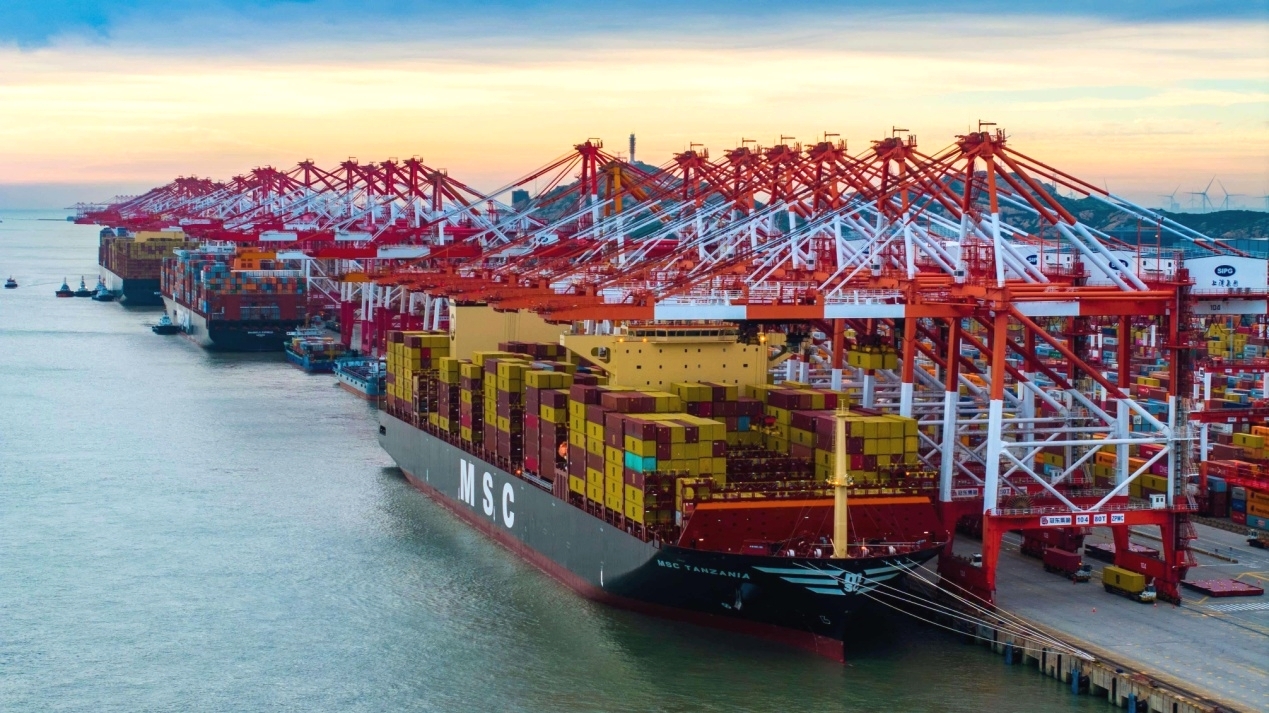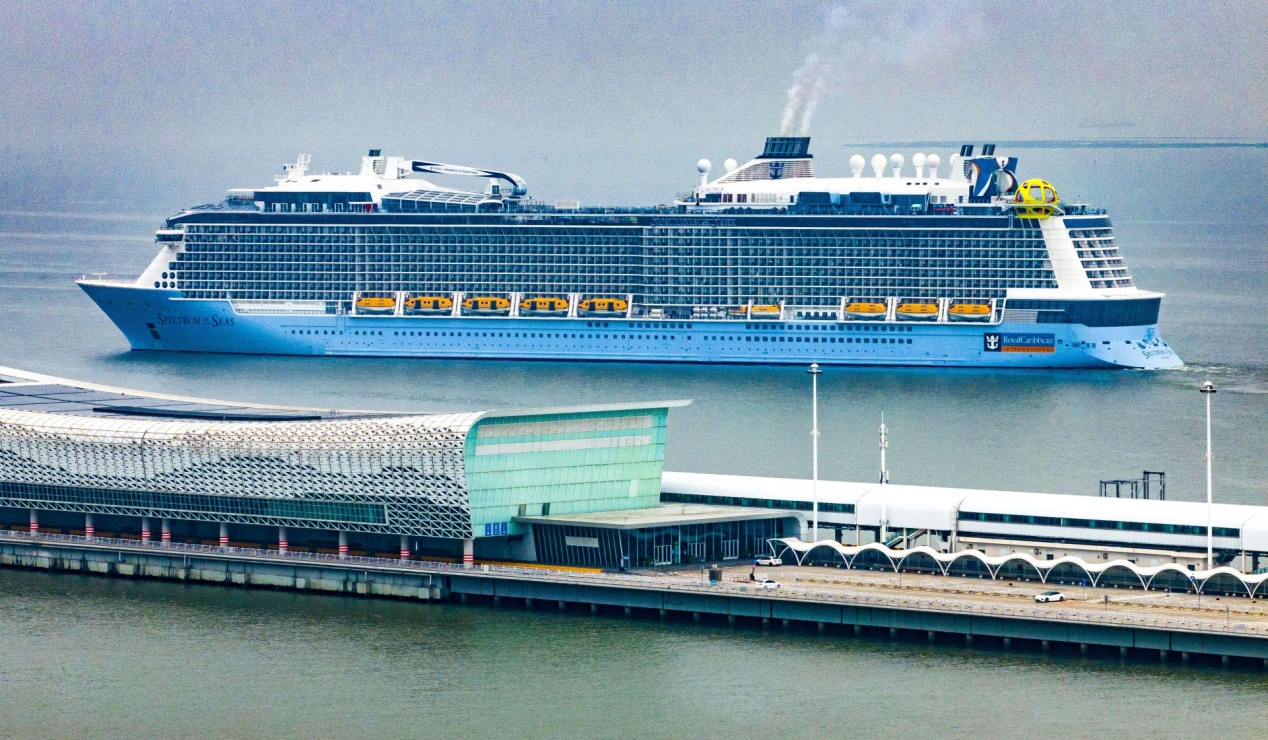Shanghai?FTZ?experience?spurs innovation-driven growth?through institutional reform

Photo taken on July 6, 2025 shows a container terminal of the Yangshan deep water port in Shanghai. (Photo/Ji Haixin)
At Nangang Terminal in southeast Shanghai, a roll-on/roll-off vessel was steadily berthed at the dock, as a fleet of electric vehicles bound for export drove in an orderly manner into the ship's hold under a "first-line direct customs release" model.
"Under this model, companies are exempt from customs declarations. With a single self-declaration, goods can move directly into and out of the Yangshan Free Trade Zone, significantly improving clearance efficiency," explained an official from Yangshan Customs under Shanghai Customs.
As the China (Shanghai) Pilot Free Trade Zone (FTZ) pursues its goal of becoming a global shipping hub, it has refined its multi-country consolidation model. Cargo shipped from overseas, transiting via Yangshan, and bound for a third country, is exempt from inspection, cutting overall handling time by 50 percent.
This reform has driven the proportion of international transit and consolidated cargo at Yangshan Port from 12.6 percent to 18.6 percent, propelling it to the top of the global container port performance rankings. In the first half of this year alone, approximately 52,000 bonded vehicles were exported through consolidation, sharply reducing logistics costs.

Photo taken on May 21, 2025 shows the Lin-gang Special Area of China (Shanghai) Pilot Free Trade Zone (FTZ). (Photo/Zhang Mingwei)
In recent years, the Shanghai FTZ has pioneered institutional innovation, exploring new pathways and achieving "zero-to-one" breakthroughs to steadily expand institutional opening up, providing what has become known as the "Shanghai FTZ experience."
Seventy-seven pilot measures tested in Shanghai will soon be promoted nationwide, extending the benefits of institutional innovation across a broader landscape.
Beyond trade facilitation, Shanghai has taken the lead in formulating high-standard digital trade rules. The city is promoting regulated cross-border data flows, advancing digital technology applications, and expanding data openness and sharing.
At the Shanghai Data Exchange in Pudong New Area, intangible and invisible data products dominate corporate discussions. Meeting the rising demand for precise and efficient data transactions is a pressing concern.
According to Li Denggao, deputy general manager of the Shanghai Data Exchange, the exchange has established a cross-border data trading framework, developed a trusted delivery mechanism and released trading rules, gradually laying a solid market foundation. In the first half of this year, the exchange's transaction volume exceeded 3 billion yuan ($417.39 million), a year-on-year increase of more than 50 percent.
Secure and efficient cross-border data flows are vital for companies' international operations.

An international cruise ship carrying passengers arrives at the Wusongkou International Cruise Terminal in Shanghai, Aug. 2, 2025. (Photo/Ji Haixin)
At the Cross-border Data Service Center in the Lin-gang Special Area of Shanghai pilot FTZ, real-time operation guidelines are displayed on electronic screens, tailored to industry-specific scenarios. In the intelligent connected vehicle sector, for example, guidelines cover cross-border production and manufacturing, global research and development testing, global after-sales services, and the global used car trade.
"In the past, cross-border data flows were managed from an industry-wide perspective, which was not sufficiently targeted for enterprises," said Lu Sen, head of the data division of the Administrative Committee of the Lin-gang Special Area. "We have identified specific data fields requiring across-border transfer and compiled detailed lists with relevant authorities to address the real challenges faced by enterprises."
In February this year, the administrative committee of the Lin-gang Special Area, together with Shanghai Cyberspace Administration and other departments, jointly issued a negative list for data exports in the Shanghai FTZ. In May, it followed with detailed operational guidelines for such exports.
Financial innovation has also been a hallmark of the Shanghai FTZ. From establishing China's first foreign-controlled joint-venture wealth management company and the first wholly foreign-owned public fund, to building an international oil and gas trading center, executing the first cross-border RMB settlement for international crude oil in digital currency, and piloting relaxed rules on non-resident mergers and acquisitions loans, the FTZ has delivered many "firsts" in financial opening up.
These breakthroughs have been followed by deeper reforms, including optimizing cross-border cash pooling for multinational corporations, advancing payment service internationalization, and continuously enhancing the free trade account system.
With inbound tourism and shopping in China continuing to boom, improving payment convenience for overseas visitors has become another focus.
Leveraging the FTZ's role as a testing ground, Ant International, an affiliate of China's Alibaba Group, has introduced two new services: enabling overseas bank cards to be linked to Alipay, China's leading mobile payment platform, and allowing overseas e-wallets to be used directly in China.
From downloading an app and linking international bank cards to scanning and paying directly with an overseas e-wallet, inbound visitors now enjoy greater payment convenience.
Meng Huating, director of the free trade zone and free trade port department of China's Ministry of Commerce, said the ministry will continue to work with relevant departments to actively support localities in replicating and adapting the "Shanghai FTZ experience" in light of their strategic positioning, industrial strengths, and local conditions.
Photos
Related Stories
- Pilot FTZs in China's coastal regions unwaveringly deepen opening up
- China rolls out guideline on upgrading pilot free trade zones
- FTZs provide robust support for foreign businesses operating in China: ministry
- China's pilot FTZs see double-digit trade growth in first three quarters
- FTZ reforms deepen China-ASEAN economic, trade ties
- Thriving development of free trade zones, Hainan Free Trade Port mirrors China's high-level opening up
- Institutional innovations in pilot FTZs shift China's opening up into higher gear
- Index released to advance institutional innovation in China's pilot FTZs
- FTZs help foreign firms thrive
- China rolls out cross-border trade in services negative lists
Copyright © 2025 People's Daily Online. All Rights Reserved.









